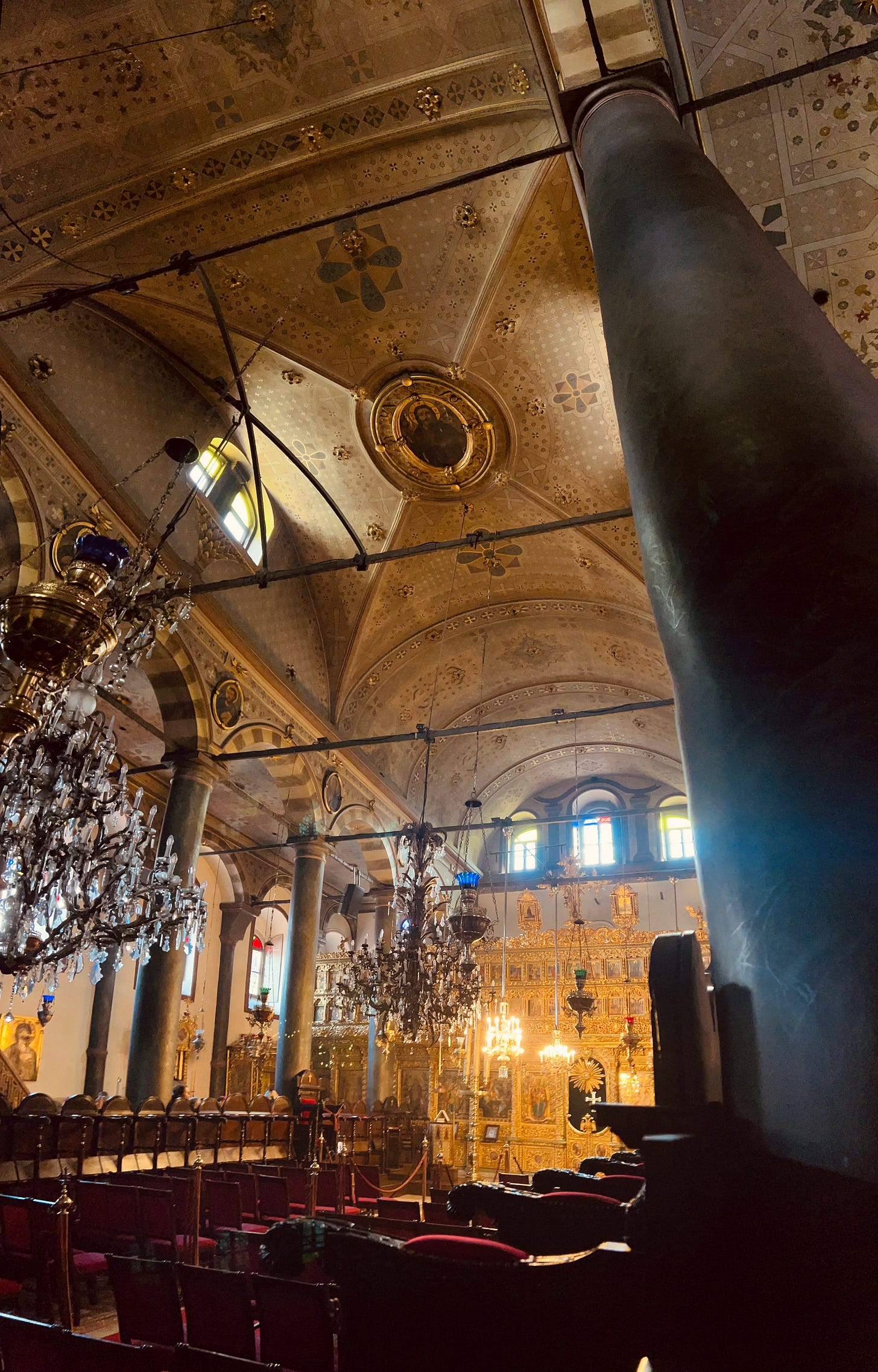“Perhaps the attempt to deal with Muslim criticism may help cure Christians of our absentmindedness.”
Trinity names a drastic change in religious perception
Yesterday I visited St. George’s in Istanbul, the patriarchal seat of the Greek Orthodox Church. As the place where the Primate of the Greek Orthodox serves, for lay shorthand, St. George’s is analogous to Catholicism’s Vatican See. Following the Ottoman conquest in 1453, Islamic invaders deposed the Patriarchate from its original location at the Hagia Sophia. The church through which the Holy Spirit bequeathed Christianity its creedal dogma is now all but unnoticeable behind the row of cafes and restaurants that surround it. Its humble dimensions and (relatively) spare sanctuary belie its present-day prominence for Orthodox believers. Simply, you would never guess this ordinary church is the beating heart of a global body of believers. It is instead the sort of building where you would expect a church secretary to change the removable letters on the front sign every week, its front lawn sporting a banner that advertises a Friday Fish Fry.
The disparity between the splendor of the Hagia Sophia and the sheer ordinariness of St. George’s once again elicited the tension I noted earlier upon exploring the Hagia Sophia; namely, how do Christians engage their Muslim neighbors on theological grounds rather than in submission to the shallow secularism demanded by Western culture.
“We’re all on different paths to the same destination” is an empty cliche that should offend Christians every bit as much as it certainly does Muslims.
The gospel poses two stumbling blocks to Islam. These are the very same obstacles that render the gospel foolishness under the rubric of the religion of Plato:
Christology
Trinitarianism.
Mary’s boy and Pilate’s victim is of one being with the Father. The eternal God has not only a mother and a beginning in time but he has also an executioner and an identifiable afternoon when he died. In proclaiming the gospel in Islam’s world, Christians may address the Christological problem by lifting up Jesus of Nazareth as a prophet of God, martyred by sinful humanity, whose faithfulness the LORD vindicated by raising him from death. In the context of locution with Islam, this quite simply suffices as the whole gospel.
Nevertheless, the second stumbling block remains.
How do we speak Christian if the God in whose name we gospel is triune?
This preaching task is more problematic.
This pilgrimage site offers up a great irony. Constantinople is to trinitarian theology what Philadelphia is to constitutional democracy, yet today Istanbul is approximately ninety-nine percent Muslim. Where Christians should understand Trinitarianism as the highpoint of their faith’s intellectual and spiritual flourishing, Islam has always seen it as Exhibit A of Christianity’s great fall from faith in the jealous God of Abraham, Isaac, and Jacob. In positing God as a triune identity, Islam judges Christianity as committing the primal sin of associating the God-who-is-God with an other than God. Therefore, the attempt to interpret God's triune reality in Islamic context is, as Robert Jenson writes, “the standing or falling point of any attempt to think through the faith’s mission in and for Islam.” The effort to speak Christian in a manner faithful to the Triune Name must function in at least three ways.
The first mode of gospel speech must be apologetic.
The beauty and legacy of the Hagia Sophia stands as stubborn, indefatigable reminder that trinitarian doctrine does not denote beliefs the church can jettison for the sake of dialogue.
Just as strenuously as Mohammad insisted that God is one and only one, the Body of Jesus attests that the God who is one is simultaneously three.
Trinitarian theology is the fruit of the church’s attempt to proclaim her scriptures— as the missionary gospel ventured into parts of the world shaped by the religion of Plato. Constantinople, what was once the center of Byzantine Christianity, is ground zero for this encounter. In other words, the church’s received dogma has a particular historical and cultural context; just so, believers cannot simply rip inherited slogans (“preexistence, three persons”) from this context, recite them in a very different Islamic context, and expect a fruitful outcome.
The second mode of gospel grammar is the reformation of Christian doctrine.
What most Christians actually have in their heads as "the doctrine of the Trinity" is not actually the church’s historic teaching.
In fact, what most Christians have in mind when thinking the Trinity is one of the heresies the doctrine of the Trinity was meant to overcome.
Thus, as the Trinity is popularly construed by well-meaning Christians, Muslims are fully justified to object to the dogma. Here in Constantinople at two different gatherings of the church catholic, the doctrine of the Trinity was a Spirt-led effort to remedy exactly Christian relapses into pagan prejudices about deity.
For example, the church father Athanasius levied as a chief accusation against the Arians, ”. . . like the Greeks you lump creature and Creator together.” And yet, a great many Christians today— especially preachers— suppose that Trinitarianism is a matter of assimilating Jesus as closely as possible to God. This is to shirk from the Christological claims of the scriptures.
As Robert Jenson writes:
“Perhaps the attempt to deal with Muslim criticism may help cure us of this absentmindedness.”
Keep reading with a 7-day free trial
Subscribe to Tamed Cynic to keep reading this post and get 7 days of free access to the full post archives.




